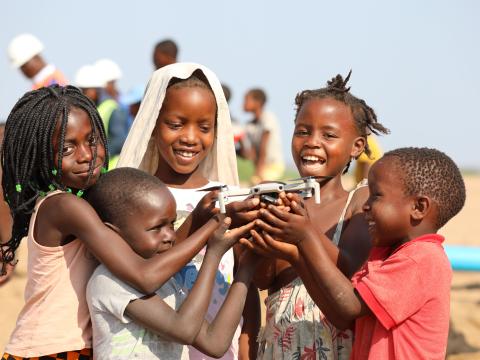A Journey of Light and Hope: Changing Children’s Lives in Mabalane, Mozambique

In a remote community in Mabalane, in Gaza Province, southern Mozambique, one of the areas covered by World Vision Mozambique’s programmes, structural changes have begun to transform local realities. In the past, children never dreamed of having access to clean drinking water, relying instead on rain‑flooded ponds, and school was rarely a priority, often taking second place to the grazing of livestock. In this area, many girls faced violence and early marriages, which kept them away from school.
Zita, only eight years old, and her friends may not know much yet, but their smiles tell the truth: they light up whenever the World Vision team enters the community. For these children, this team represents a safe harbour, a space where they can simply be children and be understood as they truly are, just children.
Although they communicate in their local language, Xixanghana, thanks to Unlock Literacy, a World Vision approach designed to ensure that all children learn to read and write with understanding, in a fun, meaningful way, connected to their own context, Zita and her peers are already taking their first steps in literacy. For them, this is a passport to uncover the mysteries of the world and to dream beyond the horizon, which is marked by the river outlining the edges of their community.
“I don’t know everything yet, but I am learning to read. One day I want to help my mother read and write messages on her phone, so she doesn’t have to ask the neighbours for help,” Zita said, in her mother tongue, Xixanghana, her eyes full of hope and confidence in what the future holds.
In Mabalane, it is common to see children very early in the morning, dew on the ground, hoe in hand, working the land. For them, especially the girls, it is a duty. Boys can sometimes mix grazing with a little leisure. Yet the truth is that here, children spend more time learning to be adults than truly living their childhood.
It is in this context that the school becomes a refuge, especially on Play Day, showing that education can also be a joyful journey. This World Vision approach ensures that, even if for a limited time, the child’s right to rest, leisure and play, as set out in Article 31 of the Convention on the Rights of the Child, is upheld.
“At home, there’s no time to play. We have to help the older ones in the fields very early, and then fetch water. Here, we can play a lot and forget everything,” Stela said, smiling, as if she really could forget it all.
From the orange of hope and the energy that drives World Vision, and the soft glow of the white cross inspiring our faith and purpose, comes the smile of the children of Mabalane. For almost six years, they have witnessed their reality transforming with every action of this organisation. Today, the future smiles with them, brighter, more alive, and full of hope.